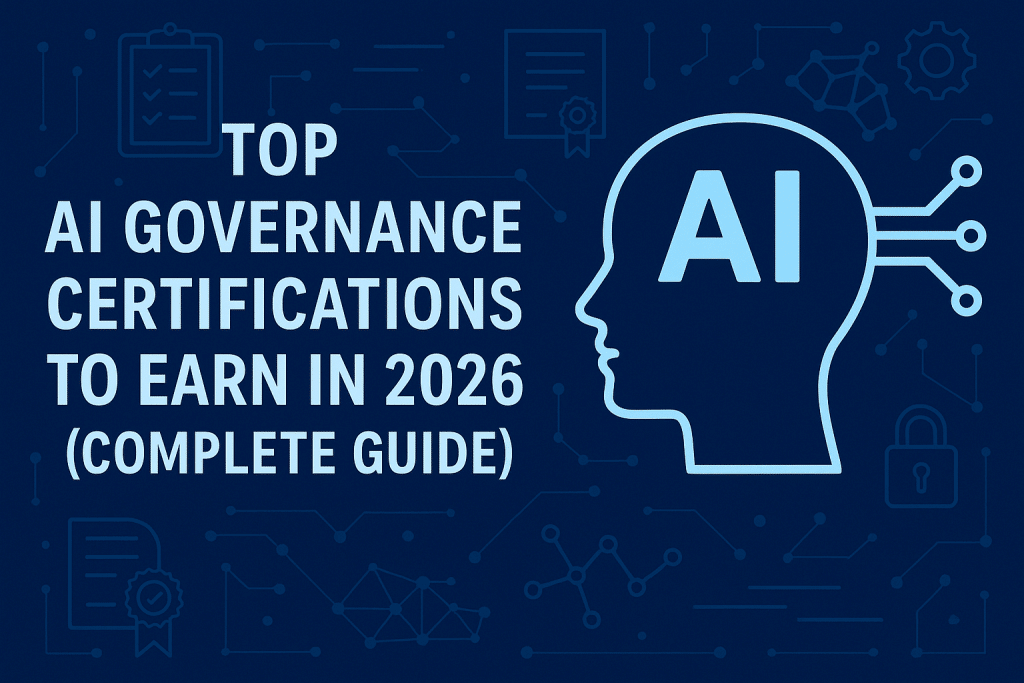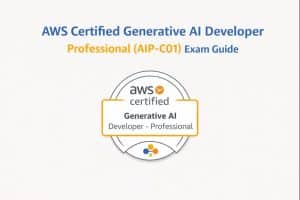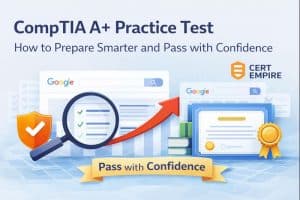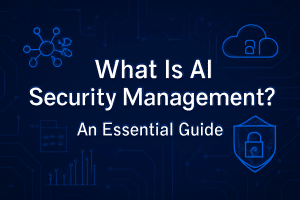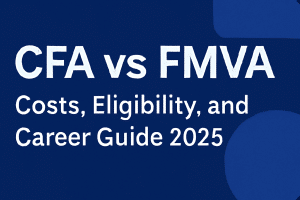TL;DR
- AI governance certifications are becoming essential for managing ethical, secure, and compliant AI systems.
- These programs teach risk management, AI ethics, data protection, and governance frameworks.
- Professionals gain hands-on skills to evaluate, audit, and implement trustworthy AI systems.
- In 2026, comprehensive programs will be highlighted that focus on ethical AI and responsible AI development.
- Certifications often include online courses, real-world risk assessment tasks, and policy training.
- Graduates can equip organizations to meet the EU AI Act and other emerging AI regulations.
- Completing one helps professionals stay ahead in the evolving AI landscape and boost their career credibility.
Introduction: The Age of Accountable AI
Artificial intelligence is no longer an experimental frontier; it’s a daily tool that drives markets, health systems, and governments. Yet as AI continues to expand, so do the challenges tied to ethics, privacy, and control. That’s where AI governance certifications enter the conversation.
These programs help professionals and organizations manage AI systems responsibly, balancing risk, transparency, and compliance. From aligning with the EU AI Act to mastering ethical AI practices, the right certification can elevate your ability to ensure AI operates fairly and securely.
This guide explores the top AI governance courses and certifications to consider in 2026, what they teach, and how they help you build trustworthy AI systems that meet global standards.
Understanding AI Governance and Why It Matters
The Foundation of AI Governance
AI governance sets the rules for how artificial intelligence (AI) is designed, trained, and used. It connects ethics, data protection, and risk management into a single governance framework that ensures accountability.
At its core, it aims to:
- Maintain transparency across all AI models
- Protect sensitive information through data security
- Align AI development with global regulations
- Minimize bias and unfair outcomes in decision-making
The growing pressure from regulatory landscapes worldwide has made this a high-demand field. Every company deploying AI systems must demonstrate responsible implementation, which is why certified governance professionals are becoming invaluable.
The Rise of Ethical AI Practices
Ethical AI goes beyond compliance; it’s about fostering trust. Modern AI governance frameworks include ethical considerations like transparency, accountability, and fairness. These principles are now taught in almost every AI governance certification course.
Professionals learn to evaluate:
- Bias and discrimination risks in AI models
- Proper risk assessment and monitoring steps
- Ethical issues related to automated decisions
By mastering ethical AI, you don’t just meet policy requirements, you help shape responsible innovation that earns public trust.
The Core Elements of AI Governance Certifications
Balancing Risk, Ethics, and Compliance
Strong AI governance certifications blend three pillars: risk management, ethics, and compliance. A comprehensive program designed around these themes trains learners to:
- Evaluate and mitigate operational and ethical risks
- Apply ethical considerations to AI development
- Build clear governance frameworks that meet policy standards
- Uphold transparency and security throughout AI lifecycles
These programs equip professionals with the knowledge and skills to design responsible AI systems that support long-term compliance and trust.
From Frameworks to Practice
Learning AI governance isn’t just about concepts on paper; it’s about real-world application. The best certifications show how to transform policy guidelines into practical actions inside an organization.
Participants learn to develop auditing plans, define governance frameworks, and conduct risk assessment workshops that mirror actual compliance tasks. This hands-on training creates a learning journey that leads to career-ready confidence.
Top AI Governance Certifications To Pursue in 2026
1. Certified AI Governance Professional (CAIGP)
A widely recognized program for those aiming to become leaders in AI governance and risk management. It covers AI ethics, data protection, and policy compliance. Learners explore global governance frameworks and gain knowledge to design responsible AI systems for organizations.
| Focus Areas | AI Governance, Risk, Ethics, Compliance |
|---|---|
| Format | Online Course + Exam |
| Ideal For | Professionals seeking governance roles in AI development and policy implementation |
This course provides a solid learning experience for those wanting to build a career rooted in ethical leadership and governance best practices.
2. AI Governance and Ethics Certificate
This comprehensive program teaches students how to design and manage AI systems aligned with ethical principles. It explores AI fundamentals, risk assessment, and ethical decision-making for modern technologies.
Key takeaways:
- Understand how to evaluate ethical and legal implications in AI development
- Create policies that support responsible AI implementation
- Learn strategies to reduce bias and increase transparency
Students who complete this course earn a certificate recognized by industry leaders for its practical approach and ethical focus.
3. Professional Program in AI Ethics and Governance
Designed for mid-level professionals in AI, data science, and policy. The program dives into ethical AI, risk management, and AI regulation. It emphasizes how governance professionals can create strategies that align with regulatory landscapes like the EU AI Act.
| Duration | 8 weeks (online) |
|---|---|
| Modules | AI Fundamentals, Ethics in AI, Risk and Compliance, Governance Frameworks |
| Outcome | Certificate of Completion with Governance Project |
Learners gain a learning journey that balances academic insight with practical experience. The focus is to equip professionals to lead AI governance initiatives and advise organizations on policy implementation.
4. Executive Certificate in AI Governance and Risk Leadership
Aimed at decision-makers and managers responsible for AI security, risk, and compliance. This course offers strategies for establishing governance frameworks that ensure AI operations meet legal and ethical standards.
Key modules cover:
- AI ethics and governance principles
- Risk assessment and response planning
- Understanding regulations and international guidelines
The program is a comprehensive program designed to build leadership capacity in governance and risk strategy. Its graduates are often seen as trusted governance professionals in the evolving AI landscape.
5. Advanced AI Governance and Policy Course
This course bridges the gap between technical and regulatory domains. It trains participants to develop and monitor governance frameworks, interpret AI regulation, and prepare for future AI governance challenges.
It is ideal for professionals working in AI development, policy, and data security, helping them build a career anchored in responsible AI governance.
| Delivery Mode | Online + Instructor Led Training |
|---|---|
| Focus | Governance Policies, AI Risk Management, Ethical Compliance |
| Duration | Online + Instructor-Led Training |
It offers a blend of ethical training, risk awareness, and regulatory knowledge that sets the tone for effective AI policy implementation across industries.
Skills and Learning Outcomes of AI Governance Certifications
Building Expertise Across Domains
Completing an AI governance certification builds a deep foundation in AI fundamentals, risk assessment, and ethical considerations. Graduates develop the confidence to evaluate and guide the safe use of AI systems in dynamic industries.
Here’s what you’ll typically master:
- Conducting thorough risk management reviews for AI pipelines
- Applying ethical AI principles to real-world AI models
- Strengthening data protection and security across implementations
- Designing governance frameworks for transparent decision-making
- Communicating effectively about compliance within organizations
This mix of technical and ethical skills ensures that professionals emerge as both AI leaders and credible governance professionals trusted to shape internal policies.
How These Certifications Equip Professionals
Each course offers a balanced learning experience combining conceptual clarity with hands-on execution. By working through case-based projects, participants develop an understanding of governance frameworks, risk strategies, and ethical decision-making.
Many certifications also emphasize transparency, a core value when dealing with AI systems and regulatory audits. Graduates leave prepared to:
- Build governance roadmaps for responsible AI
- Translate ethical considerations into measurable standards
- Drive compliance strategies that align with global AI regulation
Choosing the Right AI Governance Course for Your Career
Aligning Certification with Career Goals
Selecting the right AI governance certification depends on where you are in your professional journey. Beginners might start with AI fundamentals and ethical AI courses, while senior professionals might prefer executive programs focused on regulatory landscapes and policy development.
Consider these points when choosing a program:
- Career Relevance: Does it match your job in AI development, risk, or policy?
- Course Structure: Online flexibility vs instructor-led training
- Certification Level: Foundational, intermediate, or leadership-focused
- Time Commitment: Short online courses or long comprehensive programs
Some certifications are paid, offering official exams and verified credentials, while others are free for self-paced learning. Either path helps equip professionals to engage confidently in ethical AI governance decisions.
The Learning Journey and Exam Preparation
Most AI governance certifications feature interactive assignments, expert-led sessions, and a final exam to test understanding. Learners progress through a learning journey, covering AI fundamentals, ethics, governance frameworks, and risk management.
To successfully complete your course, you’ll typically:
- Enroll in the online program and review course modules.
- Engage in peer discussions around ethical issues and regulations.
- Attempt case-based projects that simulate real governance challenges.
- Pass the final exam demonstrating practical and ethical mastery.
This approach blends theory with hands-on application, creating a genuine learning experience that reinforces long-term understanding.
The Future of AI Governance and Regulation
The Expanding Role of Governance Professionals
The next decade will demand more governance professionals than ever before. As AI continues to drive industries, organizations will need experts who can ensure AI systems are secure, unbiased, and legally compliant.
Emerging governance frameworks already highlight the importance of ethical AI and risk assessment. Professionals capable of designing governance strategies for these evolving systems will play a critical role in shaping the future of digital trust.
Preparing for New Global Regulations
With the EU AI Act leading the charge, other governments are drafting similar laws to protect citizens and standardize AI governance practices. These policies require strict monitoring, transparency in model usage, and continuous evaluation of ethical risks.
Future-focused certifications emphasize:
- Understanding AI regulation and global compliance trends
- Designing governance systems that adapt to regulatory landscapes
- Building internal processes for ensuring compliance and auditing
This movement toward trustworthy AI systems means that certified professionals won’t just follow rules; they’ll help write them.
Final Thoughts – Staying Ahead in the Evolving AI Landscape
AI has transformed how we think, work, and govern. Yet as artificial intelligence grows, so does the need for structured governance frameworks and informed professionals to lead them.
Earning one of these AI governance certifications is more than a résumé boost; it’s a commitment to advancing responsible AI and shaping the future of ethical technology. Whether you’re a data analyst, developer, or policy lead, continuous training in this domain ensures you remain relevant, capable, and ready to lead in the evolving AI landscape.
To understand how different AI models operate and what sets them apart, explore our comprehensive comparison — Generative AI vs Predictive AI: Key Differences Explained Clearly.
Frequently Asked Questions (FAQs)
1. What is AI governance certification?
It’s a structured course or program that teaches how to oversee and control the development, deployment, and monitoring of AI systems ethically and securely.
2. Who should pursue AI governance certifications?
These certifications are best for professionals involved in AI development, data ethics, or compliance. Even managers and legal teams can benefit from understanding governance frameworks.
3. Are AI governance certifications available online?
Yes. Many reputable institutions offer online courses with flexible schedules and recognized certificates upon completion.
4. How long does it take to complete an AI governance course?
Most courses range from 6 to 10 weeks, depending on depth and level. Comprehensive programs with case studies or exams may take longer.
5. Why is AI ethics important in governance?
AI ethics ensures fairness, transparency, and accountability, reducing bias and fostering trust in artificial intelligence decision-making.
6. What skills do AI governance professionals need?
They need expertise in risk assessment, data protection, ethical AI, and an understanding of regulatory landscapes.
7. How do AI governance certifications help career growth?
They equip professionals with knowledge and leadership skills to handle AI risks, ensuring they stay competitive in a rapidly changing field.
8. What is the future of AI governance in 2026 and beyond?
Expect stronger AI regulation, more specialized training, and expanded demand for governance professionals who can align innovation with ethics.

